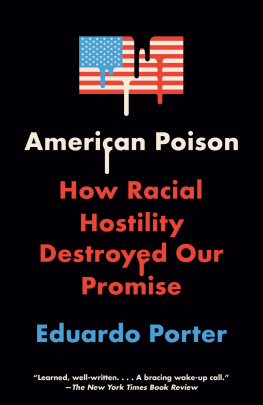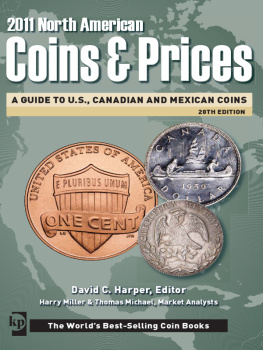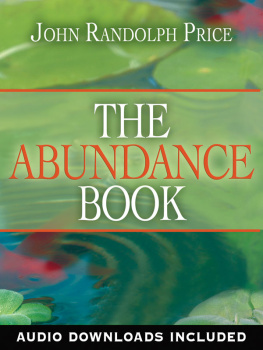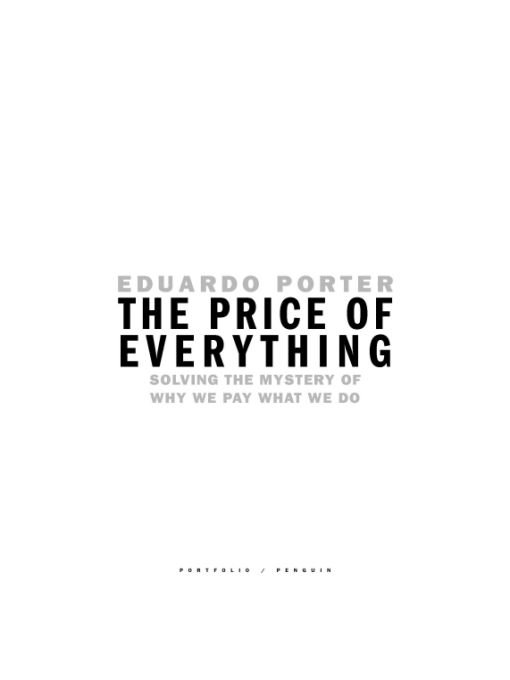Table of Contents
For Gisele and Mateo
INTRODUCTION
Prices Are Everywhere
ANYBODY WHO HAS visited a garbage dump in the developing world knows that value is an ambiguous concept. To most people in the developed world, household waste is worthless, of course. Thats why we throw it away. Apparently, Norwegians are willing to pay about $114 a ton for somebody else to sort their recyclables from the general garbage. A survey of families in the Carter community of Tennessee several years ago found they were willing to pay $363 a year, in todays money, to avoid having a landfill nearby.
But slightly beyond our immediate experience, waste becomes a valuable commodity. In Kamboins, outside Ouagadougou, Burkina Faso, farmers pay municipal trash haulers to dump unsorted solid waste on their sorghum and millet fields as fertilizerbits of plastic included. The going rate in 2003 was 400 francs per ton. In New Delhi, a study in 2002 found that waste pickers earned two rupees per kilo of plastic soda bottles and seven rupees per kilo of hard plastic shampoo bottles. A child working on foot on Delhis dumps could make twenty to thirty rupees per day.
Waste, in fact, confronts us with the same value proposition as anything else. The price we put on itwhat we will trade to have it, or have it go awayis a function of its attendant benefits or costs. A bagful of two-rupee plastic bottles is more valuable to an Indian child who hasnt eaten today than to me, a well-fed journalist in New York. What she must do to get itspend a day scavenging among the detritus of Indias capital, putting her life and health at riskis, to her, not too high a price to pay because life is pretty much the only thing she has. She has little choice but to risk it for food, clothing, shelter, and whatever else she needs. I, by contrast, have many things. I have a reasonable income. If theres one thing I have too little of, it is free time. The five cents I could get for an empty plastic bottle at the supermarkets recycling kiosk are not worth the trouble of redeeming it.
The purpose of this comparison is not to underscore that the rich have more opportunities than the poor. It is that the poor choose among their options the same way the rich do, assessing the prices of their alternatives. The relative costs and benefits of the paths open to them determine the behavior of the poorest Indian girl and the richest American man. These values are shaped by the opportunities they have and the constraints they face. The price we put on thingswhat we will trade for our lives or our refusesays a lot about who we are.
The price of garbage provides a guide to civilization. Pollution is cheapest in poor countries. Their citizens are more readily willing to accept filth in exchange for economic growth. Yet the relative price of pollution rises as people become richer. Eventually it becomes expensive enough that it can alter the path of development. China is a dirty place. Yet underlying its dismal air and foul water is a choice that balances the costs of pollution in bad health, poisonous rivers, and so forth against the cost of cutting back production or retooling plants to control their effluvia. It is a different choice from that of Switzerland, where preserving environmental assetsclean air, trees, wild animalsis considered more valuable than providing manufacturing jobs to unemployed farmers. Twice as many Swiss as Chinese are members of environmental organizations. More than a third of the Swiss population believes environmental pollution is the most important problem facing the nation; only 16 percent of Chinese feel the same.
But as China grows, the price of building one more coal-fired power plant, measured in terms of its contribution to acid rain, global warming, and the rest will one day exceed the value the Chinese place on the extra output. As it keeps growing, it will likely evolve out of the most noxious industries, like steel and chemicals, into less polluting sectors, like medical and financial services. It may even one day buy its steel and chemicals from poorer countries with a higher tolerance of foul water and air. In other words, it will behave more like Switzerland or the United States. One study concluded that emissions of sulfur dioxide peak when a countrys income per person reaches around $8,900 to $10,500. In the United States, sulfur-dioxide emissions soared until the passage in 1970 of the Clean Air Act. Since then, emissions have fallen by half.
HEREIN LIES THE central claim of this book: every choice we make is shaped by the prices of the options laid out before uswhat we assess to be their relative costsmeasured up against their benefits. Sometimes the trade-offs are transparent and straightforwardsuch as when we pick the beer on sale over our favorite brand. But the Indian scavenger girl may not be aware of the nature of her transaction. Knowing where to look for the prices steering our livesand understanding the influence of our actions on the prices arrayed before uswill not only help us better assess our decisions. The prices we face as individuals and societieshow they move us, how they change as we follow one path or anotherprovide a powerful vantage point upon the unfolding of history.
Nearly two decades ago, when he was chief economist of the World Bank, Lawrence Summers, President Barack Obamas former top economic adviser, signed his name to a memo suggesting it would make sense for rich countries to export their garbage to poor ones. Because wages are lower in poor countries, he said, they would suffer a lesser loss if workers got sick or died. I think the economic logic behind dumping a load of toxic waste in the lowest wage country is impeccable and we should face up to that, it said. Moreover, pollution mattered less in a poor country with other problems: The concern over an agent that causes a one in a million change in the odds of prostate cancer is obviously going to be much higher in a country where people survive to get prostate cancer than in a country where under 5 mortality is 200 per thousand.
Leaked a few months before the 1992 United Nations Earth Summit in Rio de Janeiro, the memo confirmed to critics that the World Bank believed poor countries were dumps. The reasoning is perfectly logical but totally insane, wrote the late Jos Lutzenberger, then Brazils environment minister, in a letter to Summers. Furious, Vice President Al Gore torpedoed Summerss chance to become chairman of then-president Bill Clintons Council of Economic Advisers. Summers apologized, explaining the memo as an attempt to offer sardonic counterpoint to sharpen analytical thinking about the trash trade.
Lutzenberger had a point. Wages are not the only benchmark of peoples value. The price of dealing with garbage in impoverished countries is often zero not because their citizens care nothing about pollution, but because their governments dont enforce pollution-related laws. But Summers had a powerful point too: in poorer countries, an untainted environment is less valuable than other things that are more abundant in richer nationsschools, for instance. Many developing nations would serve their interests best by trading trash for the chance to build an extra one.














